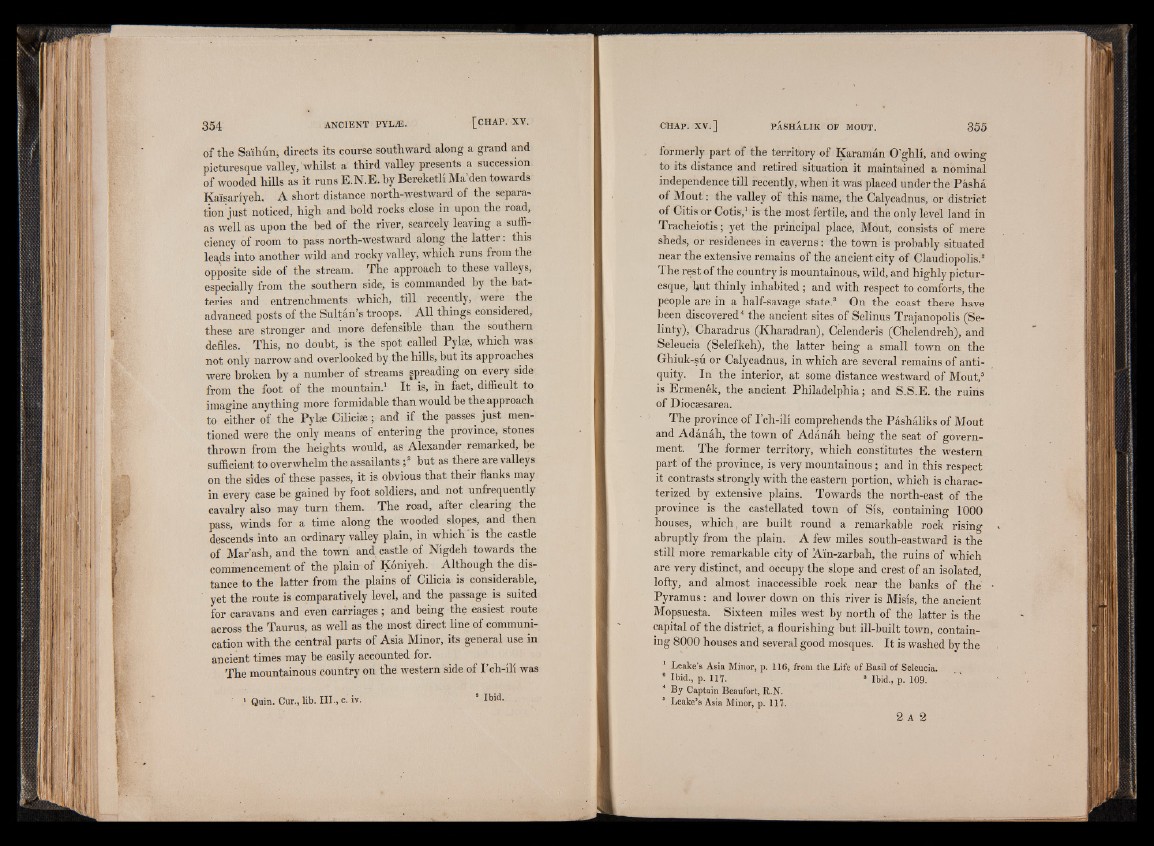
of the Sa'ihun, directs its course southward along a grand and
picturesque valley, whilst a third valley presents a succession
of wooded hills as it runs E.N.E. by Bereketli Ma’den towards
Kaisariyeh, A short distance north-westward of the separation
just noticed, high and bold rocks close in upon the road,
as well as upon the bed of the river, scarcely leaving a sufficiency
of room to pass north-westward along the latter: this
lea(ds into another wild and rocky valley, which runs from the
opposite side of the stream. The approach to these valleys,
especially from the southern side, is commanded by the batteries
and entrenchments which, till recently, were the
advanced posts of the Sultan’s troops. All things considered,
these are stronger and more defensible than the southern
defiles. This, no doubt, is the spot called Pylse, which was
not only narrow and overlooked by the hills, but its approaches
were broken by a number of streams spreading on every side
from the foot of the mountain.1 It is, in fact, difficult to
imagine anything more formidable than would be the approach
to either of the Pylse Cilicia;; and if the passes just mentioned
were the only means of entering the province, stones
thrown from the heights would, as Alexander remarked, be
sufficient to overwhelm the assailants;2 but as there are valleys
on the sides of these passes, it is obvious that their flanks may
in every case be gained by foot soldiers, and not unfrequently
cavalry also may turn them. The road, after clearing the
pass, winds for a time along the wooded slopes, and then
descends into an ordinary valley plain, in which is the castle
of Mar’ash, and the town and castle of Nigdeh towards the
commencement of the plain of Koniyeh. Although the distance
to the latter from the plains of Cilicia is considerable,
yet the route is comparatively level, and the passage is suited
for caravans and even carriages; and being the easiest route
across the Taurus, as well as the most direct line of communication
with the central parts of Asia Minor, its general use in
ancient times may be easily accounted for.
The mountainous country on the western side of I’ch-ili was
1 Quin. Cur., lib. III., c. iv. 8 Ibid.
formerly part of the territory of Karamân O’ghli, and owing
to its distance and retired situation it maintained a nominal
independence till recently, when it was placed under the Pâshâ
of Mout : the valley of this name, the Calycadnus, or district
of Citis or Cotis,1 is the most fertile, and the only level land in
Tracheiotis ; yet the principal place, Mout, consists of mere
sheds, or residences in caverns : the town is probably situated
near the extensive remains of the ancient city of Claudiopolis.2
The rest of the country is mountainous, wild, and highly picturesque,
hut thinly inhabited ; and with respect to comforts, the
people are in a half-savage state.3 On the coast there have
been discovered4 the ancient sites of Selinus Trajanopolis (Se-
linty), Charadrus (Kharadran), Celenderis (Chelendreh), and
Seleucia (Selefkeh), the latter being a small town on the
Ghiuk-su or Calycadnus, in which are several remains of antiquity.
In the interior, at some distance westward of Mout,5
is Ermenék, the ancient Philadelphia ; and S.S.E. the r u in s
of Diocæsarea.
The province of I’ch-ili comprehends the Pâshâliks of Mout
and Adânâh, the town of Adânâh being the seat of government.
The former territory, which constitutes the western
part of the province, is very mountainous ; and in this respect
it contrasts strongly with the eastern portion, which is characterized
by extensive plains. Towards the north-east of the
province is the castellated town of Sis, containing 1000
houses, which, are built round a remarkable rock rising
abruptly from the plain. A few miles south-eastward is the
still more remarkable city of Aïn-zarbah, the ruins of which
are very distinct, and occupy the slope and crest of an isolated,
lofty, and almost inaccessible rock near the banks of the
Pyramus : and lower down on this river is Misis, the ancient
Mopsuesta. Sixteen miles west by north of the latter is the
capital of the district, a flourishing but ill-built town, containing
8000 houses and several good mosques. It is washed by the
1 Leake’s Asia Minor, p. 116, from the Life of Basil of Seleucia.
8 Ibid., p. 117. 8 Ibid., p. 109.
4 By Captain Beaufort, R.N.
5 Leake’s Asia Minor, p. 117.
2 A 2